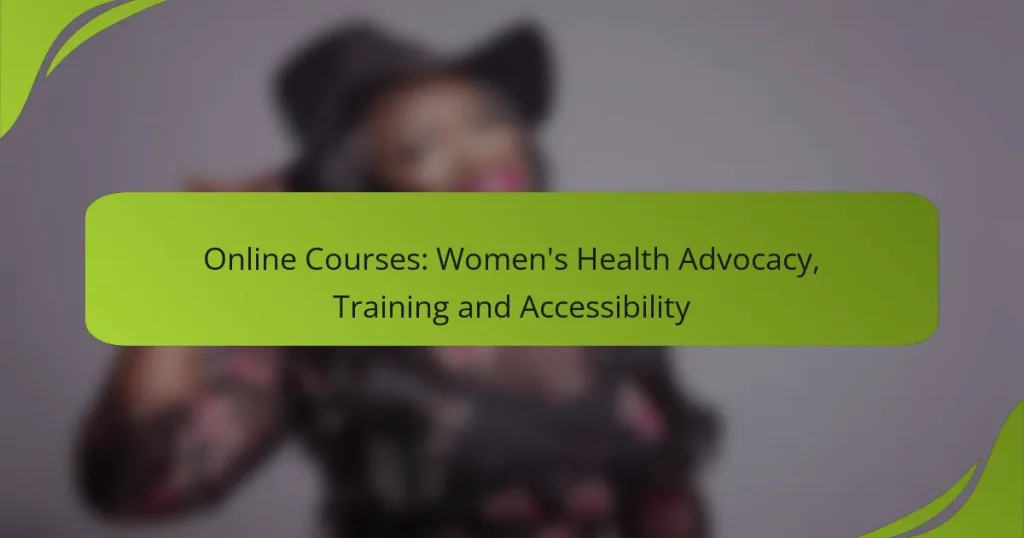Online courses play a vital role in enhancing women’s health advocacy by offering accessible education on essential health topics and advocacy techniques. These programs empower participants with the necessary skills to promote women’s health initiatives and drive policy changes, all while accommodating diverse schedules and learning preferences for a more inclusive approach to education.
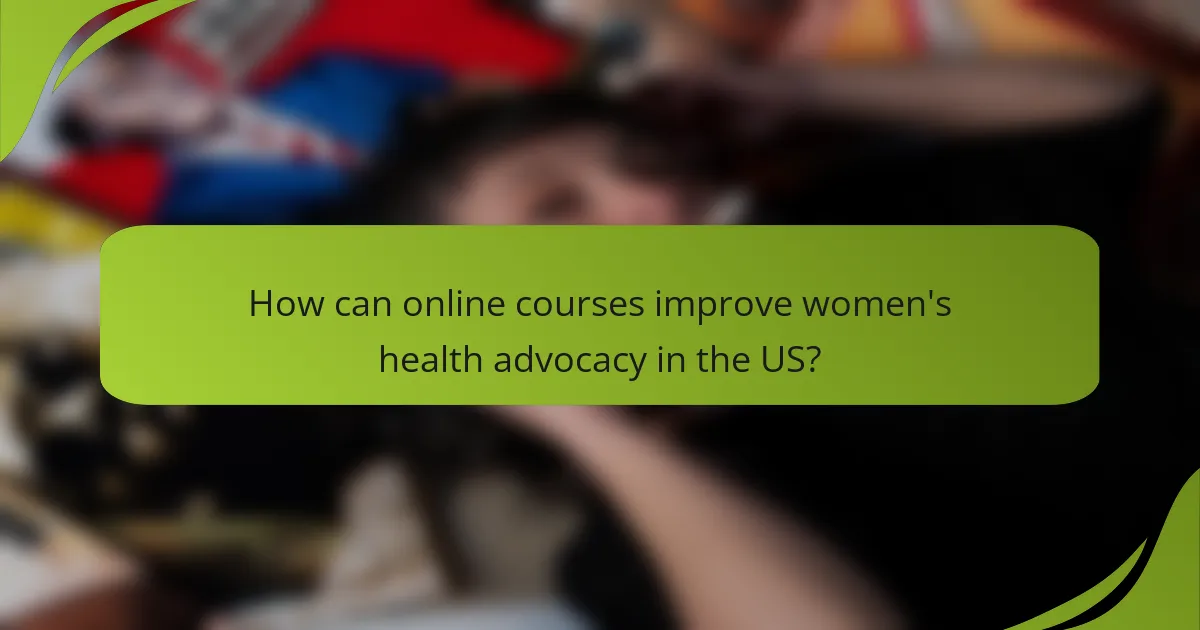
How can online courses improve women’s health advocacy in the US?
Online courses can significantly enhance women’s health advocacy in the US by providing accessible education on critical health issues and advocacy strategies. These courses empower individuals with the knowledge and skills needed to effectively promote women’s health initiatives and influence policy changes.
Increased awareness of health issues
Online courses raise awareness about various women’s health issues, including reproductive rights, maternal health, and chronic diseases. By educating participants on these topics, courses help to highlight disparities and encourage informed discussions within communities.
For instance, a course focusing on maternal health may cover statistics on maternal mortality rates, particularly among marginalized groups, prompting advocates to address these urgent concerns. This awareness can lead to community-driven initiatives aimed at improving health outcomes.
Empowerment through education
Education is a powerful tool for empowerment, especially in women’s health advocacy. Online courses equip participants with essential knowledge about health policies, advocacy techniques, and effective communication strategies. This education enables advocates to confidently engage with policymakers and stakeholders.
For example, a course that teaches negotiation skills can help advocates effectively lobby for better healthcare access or funding for women’s health programs. Empowered advocates are more likely to mobilize support and drive meaningful change in their communities.
Networking opportunities for advocates
Online courses often provide networking opportunities that connect advocates with like-minded individuals and organizations. These connections can lead to collaborations, resource sharing, and collective action on women’s health issues.
Participants can engage in discussion forums, webinars, or group projects, fostering relationships that extend beyond the course. Building a network of advocates enhances the impact of their efforts and creates a supportive community for ongoing advocacy work.
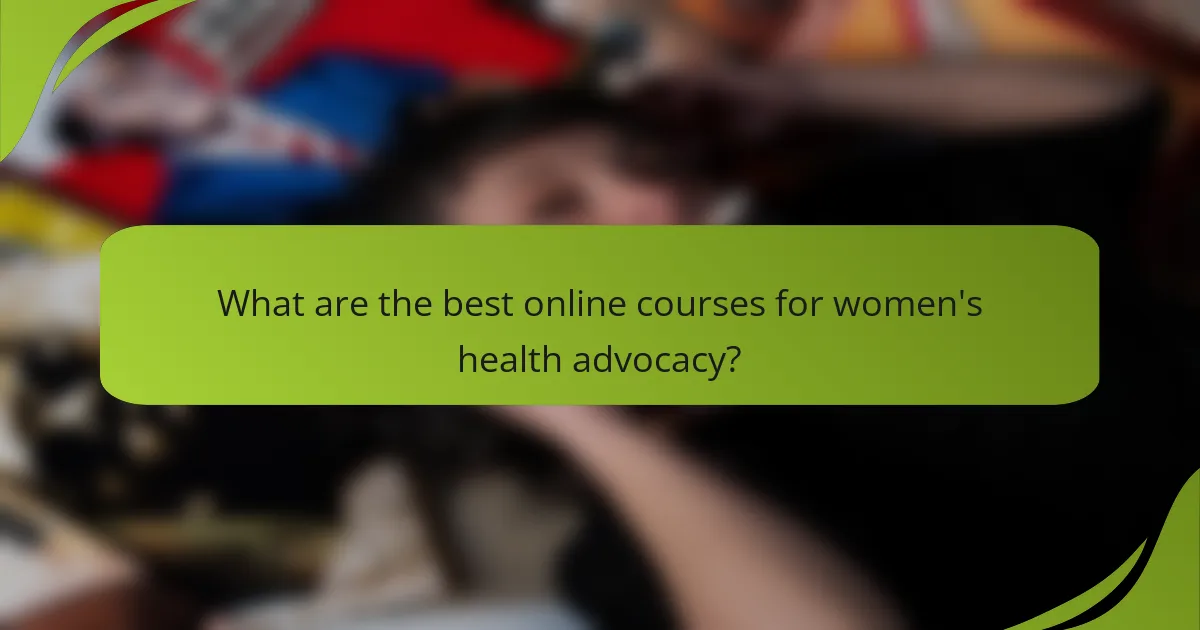
What are the best online courses for women’s health advocacy?
The best online courses for women’s health advocacy focus on equipping individuals with the knowledge and skills to promote women’s health issues effectively. These courses often cover a range of topics, including reproductive health, policy advocacy, and community engagement strategies.
Harvard’s Women’s Health Course
Harvard offers a comprehensive online course that delves into various aspects of women’s health, including biological, social, and environmental factors affecting women’s well-being. This course is designed for healthcare professionals and advocates who want to deepen their understanding of women’s health issues.
Participants can expect to engage with expert faculty and access a wealth of resources, including case studies and research articles. The course typically spans several weeks and includes assessments to reinforce learning.
Coursera’s Women’s Health Specialization
Coursera provides a Women’s Health Specialization that consists of multiple courses focusing on critical areas such as maternal health, reproductive rights, and health policy. This specialization is suitable for anyone interested in women’s health advocacy, from students to professionals.
Courses are structured to allow flexibility, enabling learners to progress at their own pace. Additionally, many courses offer certificates upon completion, which can enhance professional credentials.
University of California’s Advocacy Training
The University of California offers advocacy training specifically aimed at empowering individuals to become effective advocates for women’s health issues. This program emphasizes practical skills, including communication strategies and grassroots organizing techniques.
Participants will learn how to develop advocacy campaigns and engage with policymakers. The training often includes real-world projects, allowing learners to apply their skills in community settings.
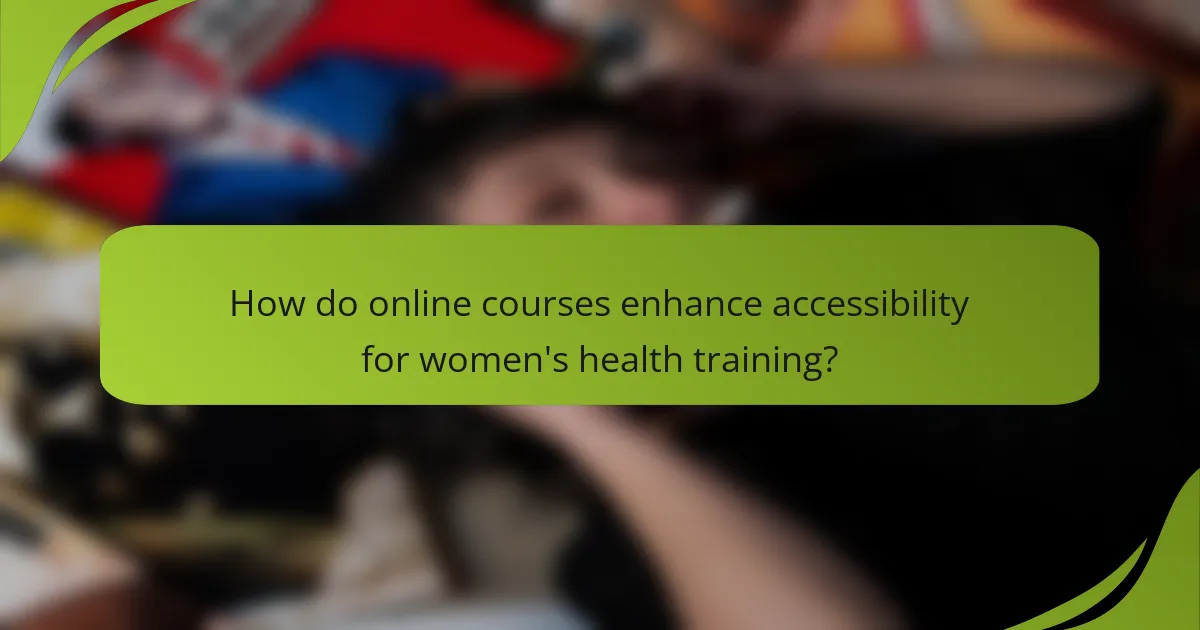
How do online courses enhance accessibility for women’s health training?
Online courses significantly enhance accessibility for women’s health training by providing flexible options that accommodate various schedules and learning preferences. This approach allows individuals to engage with critical health topics at their own pace, making education more inclusive and widespread.
Flexible learning schedules
Flexible learning schedules are a hallmark of online courses, allowing participants to access materials and complete assignments at times that suit them best. This is particularly beneficial for those balancing work, family, or other commitments, as they can tailor their study time around their personal responsibilities.
Many online programs offer asynchronous learning, meaning students can watch lectures or complete exercises whenever they choose. This flexibility can lead to higher completion rates, as learners are more likely to stick with courses that fit their lifestyles.
Remote access to resources
Remote access to resources is another key advantage of online courses in women’s health training. Participants can easily access a wealth of information, including video lectures, articles, and interactive tools, from anywhere with an internet connection. This eliminates geographical barriers that often limit access to quality education.
Additionally, many platforms provide downloadable materials and online forums for discussion, enhancing the learning experience. This ensures that learners can engage with the content and their peers, regardless of their location.
Support for diverse learning needs
Online courses are designed to support diverse learning needs, accommodating various styles and preferences. Many programs offer multimedia content, such as videos, podcasts, and written materials, catering to visual, auditory, and kinesthetic learners alike.
Furthermore, accessibility features like closed captioning, transcripts, and adjustable playback speeds help ensure that all learners can engage with the material effectively. This inclusivity is vital for fostering a comprehensive understanding of women’s health issues across different populations.
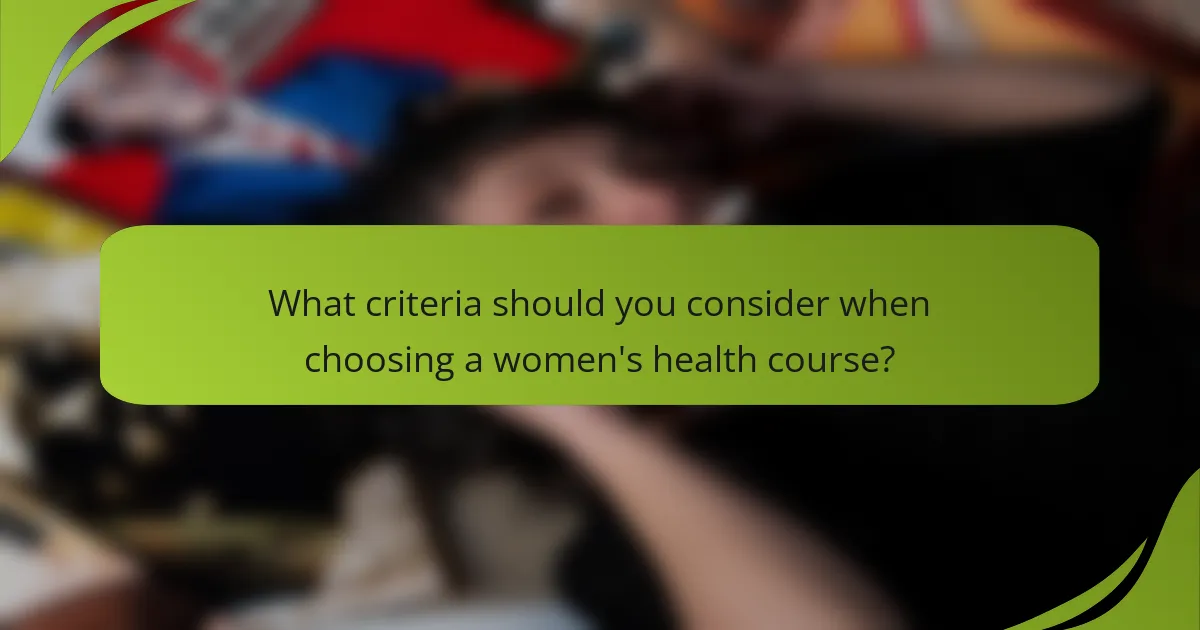
What criteria should you consider when choosing a women’s health course?
When selecting a women’s health course, consider factors such as the accreditation of the institution, the relevance of the course content, and the qualifications of the instructors. These criteria ensure that the education you receive is credible, applicable, and delivered by knowledgeable professionals.
Accreditation of the institution
Accreditation is a key indicator of the quality and reliability of a women’s health course. Look for programs accredited by recognized bodies, as this often signifies adherence to educational standards and industry practices. In the U.S., for example, check if the institution is accredited by organizations like the Council on Education for Public Health (CEPH).
Additionally, accredited programs may be eligible for federal financial aid, making them more accessible. Verify the accreditation status on the institution’s website or through official educational directories.
Course content relevance
The relevance of course content is crucial for ensuring that you gain applicable knowledge and skills in women’s health advocacy. Review the syllabus to see if it covers current issues, trends, and practices in women’s health, such as reproductive rights, maternal health, and health equity.
Consider whether the course includes practical components, such as case studies or community projects, which can enhance your understanding. Look for programs that align with your career goals or interests within the women’s health sector.
Instructor qualifications
Instructor qualifications significantly impact the quality of education you receive in a women’s health course. Check the instructors’ backgrounds, including their education, professional experience, and areas of expertise in women’s health. Instructors with real-world experience can provide valuable insights and practical knowledge.
Additionally, consider the instructor-to-student ratio, as smaller classes often allow for more personalized attention and interaction. Engaging with qualified instructors can enhance your learning experience and provide networking opportunities in the field.
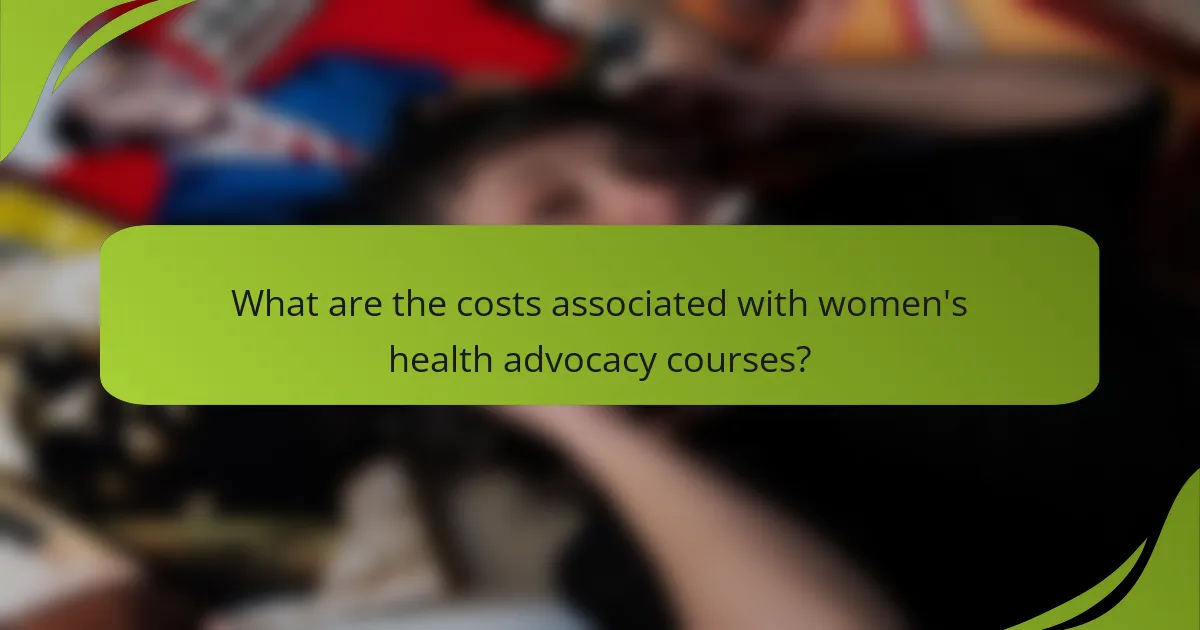
What are the costs associated with women’s health advocacy courses?
The costs of women’s health advocacy courses can vary significantly based on the program’s accreditation, duration, and delivery method. Generally, students should expect to pay anywhere from a few hundred to several thousand dollars depending on the institution and the level of certification offered.
Tuition fees for accredited programs
Tuition fees for accredited women’s health advocacy programs typically range from approximately $1,000 to $5,000. Programs offered by universities or colleges may be on the higher end, while community colleges or online platforms might offer more affordable options. It’s essential to verify the accreditation status of the program to ensure it meets industry standards.
Additionally, some programs may charge extra fees for materials, technology access, or certification exams. Always review the total cost breakdown before enrolling to avoid unexpected expenses.
Financial aid options available
Many institutions provide financial aid options for women’s health advocacy courses, including scholarships, grants, and federal student loans. Prospective students should explore both federal and state financial aid programs, which can significantly reduce out-of-pocket costs.
Additionally, some organizations focused on women’s health may offer specific scholarships for advocacy training. It’s advisable to research and apply for these opportunities early, as funding can be competitive.
Cost comparison between platforms
When comparing costs between different online platforms offering women’s health advocacy courses, consider factors such as course length, accreditation, and included resources. For instance, platforms like Coursera or edX may charge between $300 and $1,200 for individual courses, while comprehensive programs from universities can exceed $3,000.
Creating a simple comparison chart can help you visualize the differences in tuition, course content, and additional fees. This will aid in making an informed decision based on your budget and educational goals.
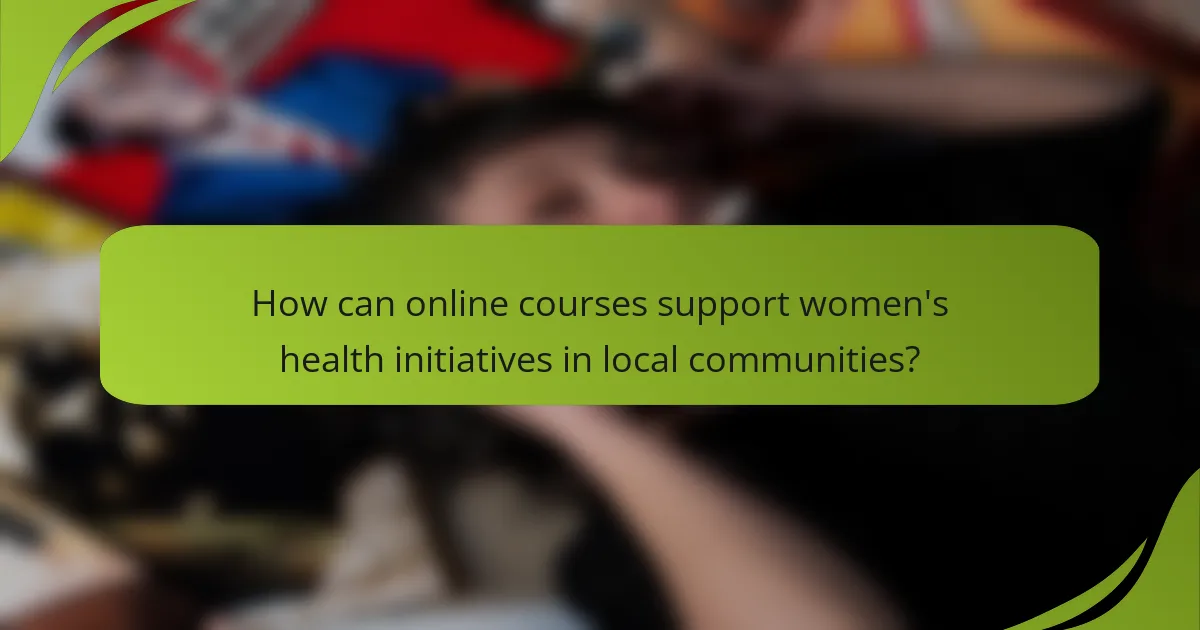
How can online courses support women’s health initiatives in local communities?
Online courses can significantly enhance women’s health initiatives by providing accessible education and training tailored to local community needs. These courses empower individuals with knowledge and skills to advocate for women’s health issues effectively.
Accessibility of Online Learning
Online learning platforms offer flexibility, allowing participants to access courses at their convenience. This is particularly beneficial for women who may have caregiving responsibilities or work commitments that limit their availability for in-person training.
Many platforms provide courses at various price points, often free or low-cost, making education more attainable. This accessibility can help bridge gaps in knowledge and resources in underserved communities.
Training for Health Advocates
Online courses can equip health advocates with essential skills, such as effective communication, community outreach, and policy advocacy. These skills are crucial for promoting women’s health issues and mobilizing community support.
Courses often include case studies and real-world applications, allowing participants to learn from successful initiatives. For example, training might cover how to organize health workshops or navigate local health systems.
Building Community Networks
Online courses can foster connections among participants, creating a network of advocates who can collaborate on women’s health initiatives. Discussion forums and group projects encourage sharing experiences and strategies.
By building these networks, advocates can amplify their impact, share resources, and support each other’s efforts in addressing local health challenges. These connections can lead to joint initiatives that better serve community needs.
